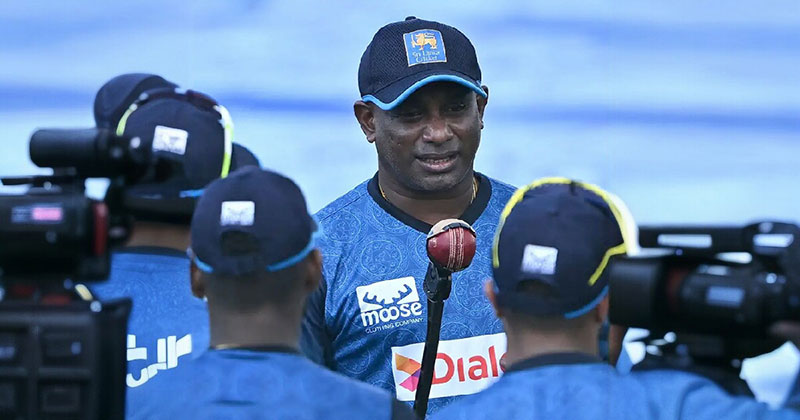Sports
How Jayasuriya transformed Sri Lanka into a winning machine

Rex Clementine in Kandy
On a balmy Thursday night in Dambulla, a sell-out crowd witnessed Sri Lanka clinch a historic first-ever series win over the West Indies. Despite the Caribbean side’s reputation as a T20 powerhouse, ranked third in the world, they were outclassed by an eighth-ranked Sri Lankan team that stuck to the basics. No brute-force power hitting. Instead, they backed their strengths, smart running between the wickets, and reintroduced the disciplined cricket that seemed lost not long ago. Behind this revival stands one man—Sanath Jayasuriya.
In just three months, Jayasuriya has reshaped this team by drilling down on four key pillars: sharp fielding, quick running between the wickets, commitment, and fitness. Under his leadership, optional training has become a thing of the past, and the team is honing their skills with a clear focus on getting better every day.
Yet, like any team in transition, Sri Lanka is far from the finished product. There are areas that still need attention: power hitting, greater accuracy from the spinners, and an end to those sudden batting collapses. But the strides they’ve made suggest that in 12 months’ time, we may once again see the kind of dynamic, aggressive cricket that Sri Lanka is famous for.
One of Jayasuriya’s greatest successes has been unlocking the potential of Kusal Mendis. Talented but inconsistent, Mendis has long been a source of frustration—brimming with ability but frequently throwing his wicket away or finding trouble off the field. Much like how Pep Guardiola transformed Raheem Sterling into one of football’s most reliable forwards, Jayasuriya has quietly re-engineered Mendis’ mindset. He took Mendis aside and made it clear: follow the program or face the consequences. The turning point came when Mendis was dropped for the Lord’s Test in August, a wake-up call he desperately needed. Since then, the player who once seemed destined for a career of wasted potential has been a revelation.
Mendis has shown his class not just in one-off performances but in key moments. He played a pivotal role in Sri Lanka’s victory at The Oval, notched a crucial century against New Zealand in Galle, and delivered a match-winning knock in the series-deciding third T20 against the West Indies. From a player who seemed unreliable, like a tennis player double-faulting on match point, Mendis has evolved into a calm, strategic leader—offering advice to the captain on reviews, constantly talking to the bowlers, and mentoring younger players like Pathum Nissanka. It’s a transformation akin to Virat Kohli’s journey from a hot-headed rookie to a composed, world-class performer who takes responsibility for his team’s fortunes.
However, Jayasuriya’s revival hasn’t been without its challenges. Power hitting, for instance, remains a work in progress. Bhanuka Rajapaksa, a naturally gifted batsman, has been tasked with this role, but his fitness issues and slow movement in the field make him a liability. It’s a situation reminiscent of how Diego Maradona handled Ariel Ortega during his coaching stint—brilliant on his day, but inconsistent due to personal shortcomings. One suspects that Jayasuriya has laid down an ultimatum for Bhanuka: improve your fitness and focus, or risk being dropped. In such a results-driven environment, both Bhanuka and the trainers know that time is ticking.
What Jayasuriya’s tenure proves is that Sri Lanka doesn’t need a foreign coach to clean up the mess. A homegrown leader, one who understands the culture and the players, can do wonders. Much like how Bob Woolmer built the South African team around focusing on discipline, teamwork and fielding rather than big-name stars, Jayasuriya has taken a no-nonsense approach with this young side. He knows when to hand out praise and when to demand more, keeping everyone on a tight leash but ensuring they feel supported.
The results are already speaking for themselves. Sri Lanka ended a 27-year drought by beating India in a series, won a Test match in England after ten long years, claimed their first Test series victory over New Zealand in 15 years, and now a first-ever T20 series triumph over the West Indies. In the span of three months, this team has made significant progress across all three formats.
years, and now a first-ever T20 series triumph over the West Indies. In the span of three months, this team has made significant progress across all three formats.
It’s clear that a hands-on coach like Jayasuriya can do wonders for a team still finding its feet. Like any great coach, he’s not just focused on short-term wins but on building a sustainable model for success. The path ahead may have its challenges, but Sri Lanka’s resurgence under Jayasuriya has already begun, and the future looks bright.
Sports
Police investigating death of Cricket Malawi operations director Arjun Menon

Arjun Menon, Cricket Malawi’s operations director, has died aged 48. Police are reported to be investigating the circumstances of his death in Blantyre, Malawi’s financial and commercial capital, on Sunday.
Menon played for Singapore and held coaching roles with various international teams including Chile, Botswana, Indonesia and Singapore before taking on the Malawi role in 2020.
“As Cricket Malawi, we are devastated by this loss because Arjun did so much to our transformative agenda,” Vivek Ganesan, the president of Cricket Malawi, told Nation Online. “All the successes we have so far are attributed to him. This is a very painful loss.”
Dr. Henry Kamata, CEO of the Malawi National Council of Sports, also conveyed his condolences in a statement. “Arjun was a dedicated coach and a passionate advocate for the development of cricket in Malawi,” he said. “His contributions to the sport were immense and far-reaching, playing a pivotal role in the growth and success of the Malawi cricket team on regional and international platforms.
“His commitment, professionalism, and vision were truly inspirational, and his loss is a devastating blow to the sporting fraternity in Malawi and beyond.”
During Menon’s tenure, the Malawi men’s team were runners-up behind Tanzania in Group A of the T20 World Cub Sub Regional Africa Qualifier in September 2024. The Under-19 women’s team, meanwhile, topped Division 2 of the 2025 Under-19 Women’s T20 World Cup Africa Qualifier, gaining entry to Division 1 where they achieved a seventh-place finish.
[Cricinfo]
Sports
Ashlin wins third title at Colombo Championships

St. Peter’s College, Bambalapitiya player Ashlin de Silva won his third title of the 110th Vision Care Colombo Championships when he beat Mayooran Kubheran in the Under 16 boys’ sigles final at the Sri Lanka Tennis Association clay courts.
While Ashlin clinched the Under 16 boys’ title, Akesha Silva bagged the girls’ singles title of that age category.

Akesha Silva
Ashlin beat Kubheran 6-0 in the first set before the latter retired when the score was 3-1 in Ashlin’s favour.
Ashlin was also the winner of the Under 18 boys’ singles and joined Kubheran to clinch the Under 16 boys’ doubles title, beating Yudheerya Atapattu and Damsath Peiris 7-6, 6-2.
In the Under 16 girls’ final Newstead College player Akesha Silva beat Annaya Norbert 7-6 (3), 6-3.
Latest News
IPL 2025 to resume on May 17, final to be played on June 3

IPL 2025 will resume on May 17 and end on June 3, as per the revised schedule announced by the BCCI on Monday night.
The remainder of the tournament, which was suspended on May 9 for a week due to cross-border tensions between India and Pakistan, will be played at six venues: Bengaluru, Jaipur, Delhi, Lucknow, Mumbai and Ahmedabad. The venues for the playoffs will be announced later, but the matches will be played on the following dates: Qualifier 1 on May 29, the Eliminator on May 30, Qualifier 2 on June 1 and the final on June 3. A total of 17 matches will be played after the resumption, with two double-headers, both of which will be played on Sundays.
The revised schedule features 13 league games and the four playoff matches. This means that the Punjab Kings (PBKS) vs Delhi Capitals (DC) game, which was called off midway through the first innings on May 8 in Dharamsala, will be played again, on May 24 in Jaipur, which will be the temporary home base for PBKS. Two days later, PBKS will play against Mumbai Indians (MI), a match they were originally meant to play in their second home base of Dharamsala on May 11. The match that will restart the tournament on May 17 will be played between Royal Challengers Bengaluru (RCB) and Kolkata Knight Riders (KKR) in Bengaluru.
On the first of the two double-header days, Rajasthan Royals (RR) will meet PBKS in the day game (3.30pm IST) on May 18 and DC will take on Gujarat Titans (GT) in the evening (7.30pm IST). The next Sunday – May 25 – will see GT take on Chennai Super Kings (CSK) in the day game in Ahmedabad and Sunrisers Hyderabad (SRH) meet KKR in Delhi at 7.30pm IST. The last league game will be between Lucknow Super Giants (LSG) and RCB on May 27 in Lucknow.
The change in venues also means that three teams – PBKS, CSK and SRH – won’t get to play on their original home grounds anymore. With CSK and SRH out of the playoffs race, PBKS will count themselves unlucky to be playing two of their home matches at a neutral venue. With 15 points from 11 matches, PBKS were third on the points table before the tournament was suspended.
The official release said the BCCI held “extensive consultations with government and security agencies, and with all the key stakeholders” before finalising the resumption of the tournament.
The delayed finish of the IPL, which was originally scheduled to end on May 25 in Kolkata, means it will now coincide with the entire ODI series between England and West Indies starting on May 29 in Birmingham and ending on June 3 at The Oval. It will lead to a clash for Romario Shepherd (RCB), Shamar Joseph (LSG) and Sherfane Rutherford (GT), who have all been picked in the West Indies ODI squad. England have not named their squad yet but the players likely to be affected are Jos Buttler (GT), Phil Salt (RCB), Jacob Bethell (RCB), Liam Livingston (RCB), Will Jacks (MI) and Reece Topley (MI), depending on which teams make the playoffs.
The revised IPL schedule also squeezes the gap between the IPL final and the WTC final to just seven days, with Australia and South Africa set to contest the Test world title from June 11 at Lord’s. Both Australia and South Africa are scheduled to announce their squads on Tuesday. The players who are currently part of the IPL teams and are likely to be picked for the WTC final are Australia captain Pat Cummins and Travis Head (both SRH), Mitchell Starc and Tristan Stubbs (both DC), Josh Hazlewood (RCB), Marco Jansen and Josh Inglis (both PBKS), Aiden Markram (LSG), Kagiso Rabada (GT), Ryan Rickelton (MI) and Kwena Mphaka (RR).
The revised schedule will also potentially impact the India A tour of England, which is scheduled to begin from May 30, for two unofficial Tests in Canterbury and Northampton. Several fringe India players, some of whom are likely to be part of the India squad for the five-Test series starting on June 20 in England, will now be part of the IPL when the A matches begin.
For now, the biggest challenge for the 10 IPL franchises will be to re-assemble their squads and bring back overseas players and support-staff members who had begun flying back home over the weekend. The team that could find it easiest to get back together will be GT, currently on top of the table, who had seen only two of their overseas players fly back: Buttler and Gerald Coetzee. The rest of their squad was continuing to train in Ahmedabad. MI could also benefit from the revised schedule, as their first game is on May 21, four days after the tournament resumes.
-

 Latest News6 days ago
Latest News6 days agoNPP win Maharagama Urban Council
-

 Features2 days ago
Features2 days agoSAITM Graduates Overcome Adversity, Excel Despite Challenges
-

 Business5 days ago
Business5 days agoJohn Keells Properties and MullenLowe unveil “Minutes Away”
-

 Sports2 days ago
Sports2 days agoASBC Asian U22 and Youth Boxing Championships from Monday
-

 News2 days ago
News2 days agoDestined to be pope:Brother says Leo XIV always wanted to be a priest
-

 Foreign News3 days ago
Foreign News3 days agoMexico sues Google over ‘Gulf of America’ name change
-

 Opinion5 days ago
Opinion5 days agoRatmalana: An international airport without modern navigational and landing aids
-

 Business6 days ago
Business6 days agoNDB Bank partners with Bishop’s College to launch NDB Pixel awareness





















